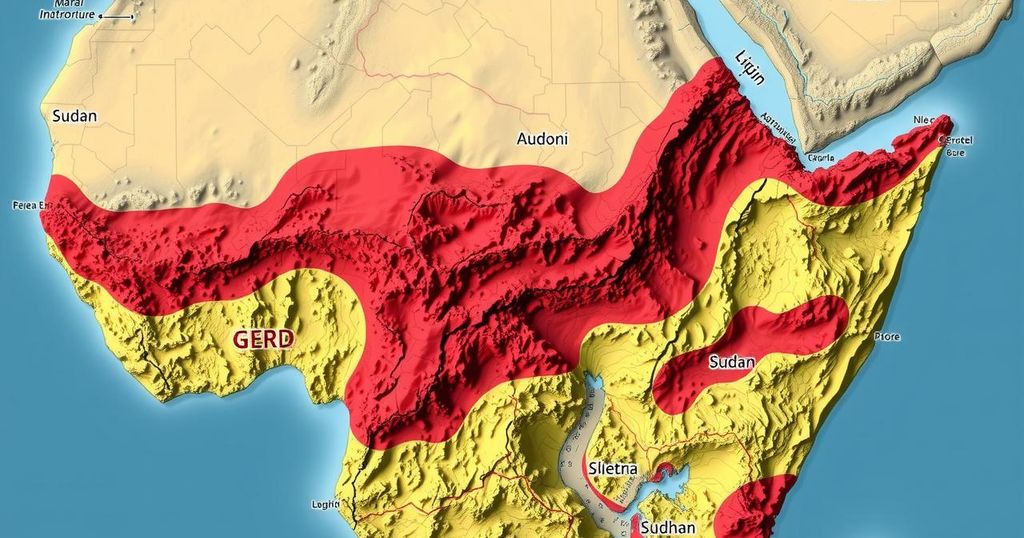World news
ABD, ABDELKARIM EL AMIN, AFAR, AFRICA, AID OPERATIONS, CLIMATE, CLIMATE CHANGE, DA, DABANGA, DABANGA – RADIO TV ONLINE, DISASTER MANAGEMENT, EGYPT, EL AMIN, EMERGENCY RESPONSE COORDINATION CENTRE, EUROPEAN CIVIL PROTECTION AND, EUROPEAN CIVIL PROTECTION AND HUMANITARIAN AID OPERATIONS –, FLOODING, GFZ, GFZ HELMHOLTZ CENTRE FOR GEOSCIENCES, GRAND ETHIOPIAN RENAISSANCE DAM, NATURAL DISASTERS, RADIO TV, SUDAN, US GEOLOGICAL SURVEY
Fatima Alavi
0 Comments
Ethiopian Earthquakes: Experts Reassure on GERD Safety Amid Seismic Activity
Following a series of earthquakes in Ethiopia, experts have reassured that the Grand Ethiopian Renaissance Dam remains safe from these seismic activities. The latest quake measured 8.1 in magnitude, yet geoscientists assert its distance from the dam mitigates risk. They recommend a cooperative scientific review of the GERD’s environmental effects in the Nile Basin to facilitate effective resource management.
Recent seismic activity in Ethiopia’s Afar region has raised concerns about its potential impact on the Grand Ethiopian Renaissance Dam (GERD) and neighboring Sudan. Despite a series of significant earthquakes, including a recent 8.1 magnitude quake, Sudanese experts have assured the public that the proximity of these seismic events to the GERD is minimal, with the closest tremor occurring over 100 kilometers away. Engineer Abdelkarim El Amin emphasized that the GERD was designed with seismic considerations in mind and could withstand such events, even when fully loaded. He noted that previous geological studies ensure the dam’s placement is away from high-risk earthquake zones. While concerns regarding the reservoir’s low water levels persist, El Amin termed the likelihood of structural failure due to recent tremors as highly improbable.
The discussion extends to the broader implications of GERD’s operations for the Nile Basin, where a hypothetical partial failure could lead to extensive flooding in Sudan and Egypt due to the low-lying geography surrounding the Nile. This could significantly affect areas along the Blue Nile basin and impact major dams within Sudan. El Amin advocates for collaborative scientific investigations to address the environmental implications of the GERD while moving beyond political discourse and towards a comprehensive understanding of water resource management in Sudan.
The Grand Ethiopian Renaissance Dam (GERD) is a controversial hydroelectric dam on the Blue Nile River, developed by Ethiopia, which has raised concerns among Sudan and Egypt regarding its potential impact on water flow and safety in the region. The recent earthquakes in Ethiopia, particularly in the Afar region, have prompted fears about the structural integrity of the GERD and its implications for the surrounding countries. Understanding the seismic risks and the engineering behind the dam is crucial for assessing these concerns.
In light of recent earthquakes in Ethiopia, concerns regarding the GERD’s structural integrity and its effects on Sudan remain largely unfounded, according to Sudanese geoscientists. With seismic events occurring far from the dam and extensive engineering studies corroborating its safety, the focus should shift to collaborative management of water resources in the Nile Basin. Implementing a scientific approach free of political bias will be essential in addressing the GERD’s environmental impacts moving forward.
Original Source: www.dabangasudan.org




Post Comment